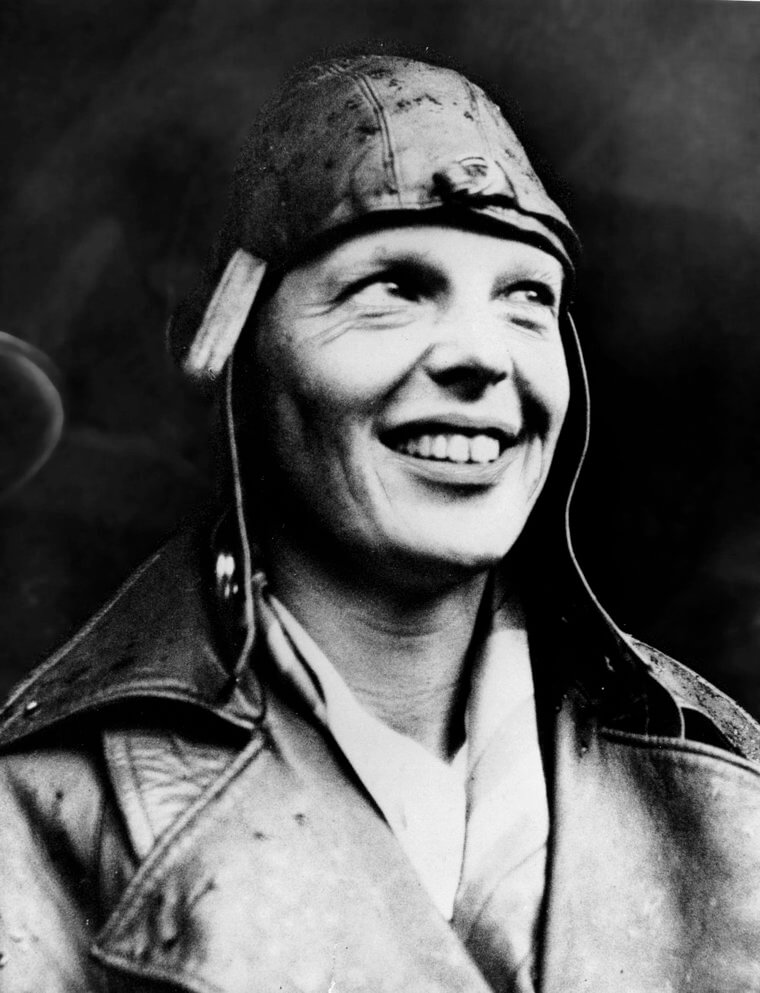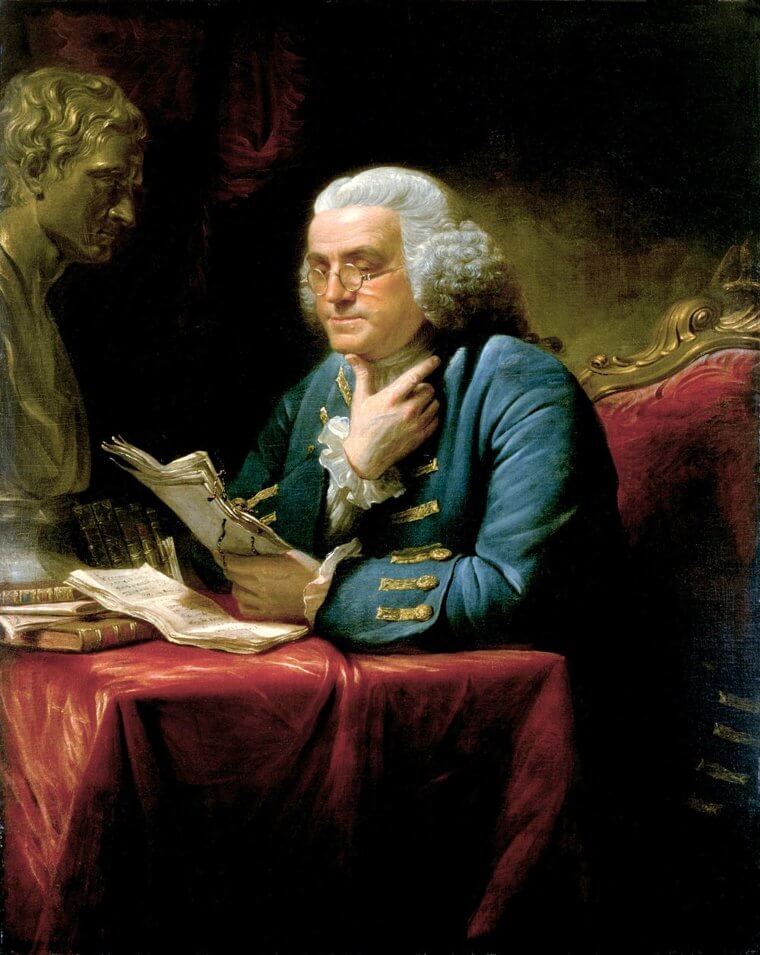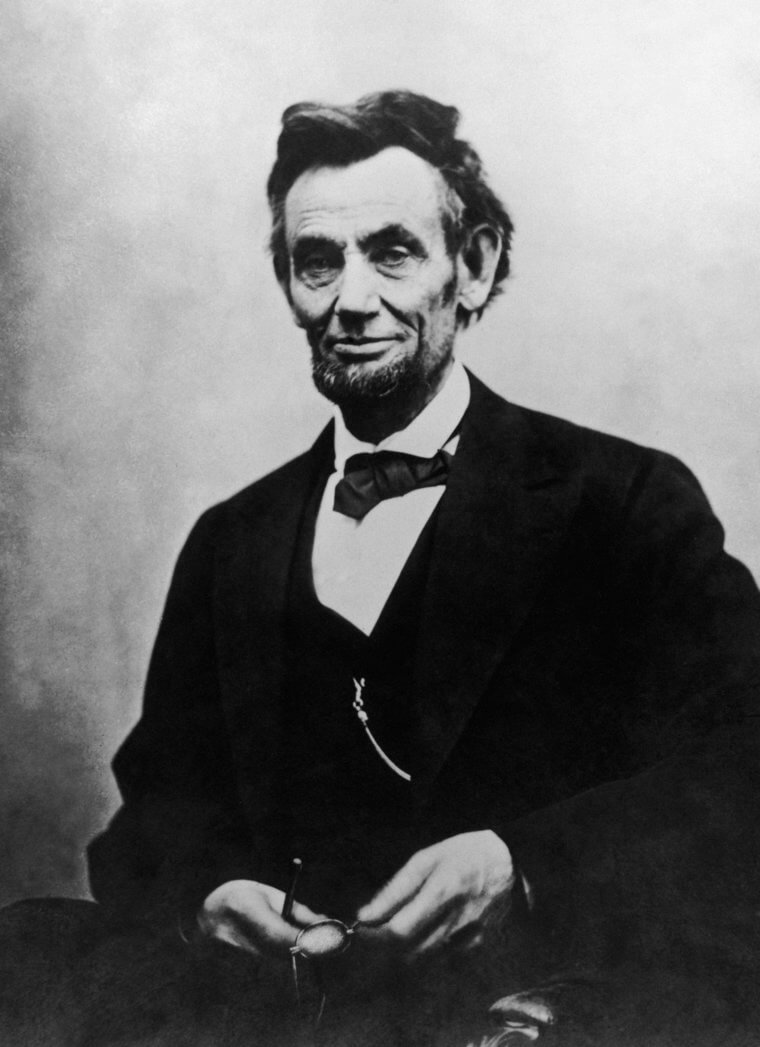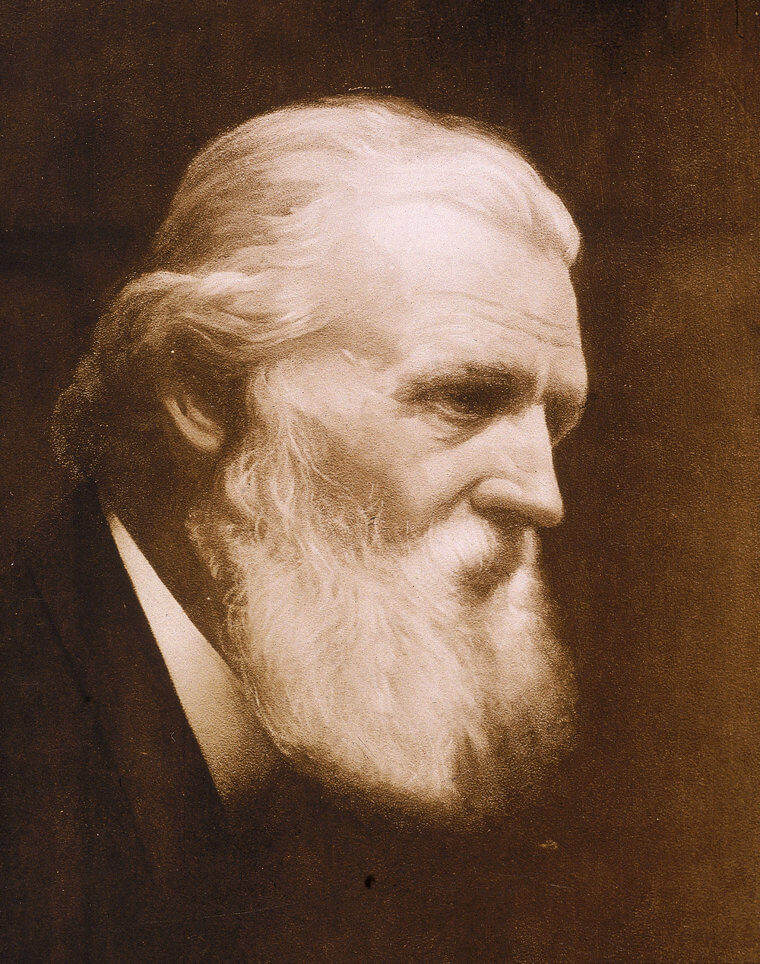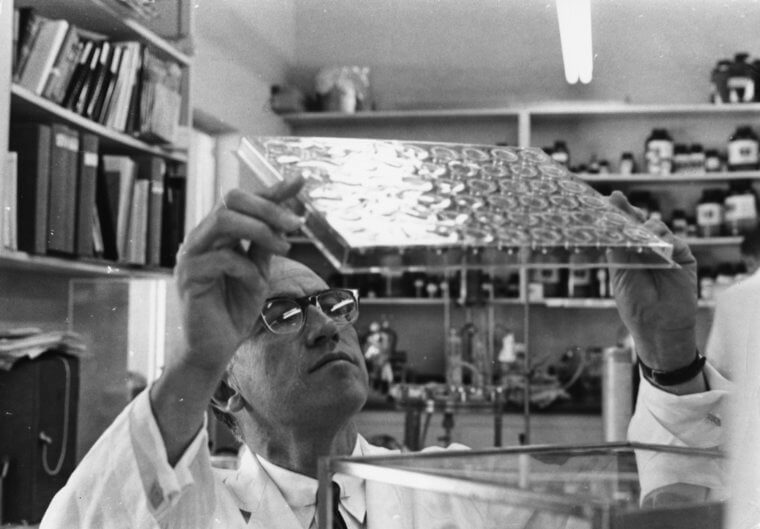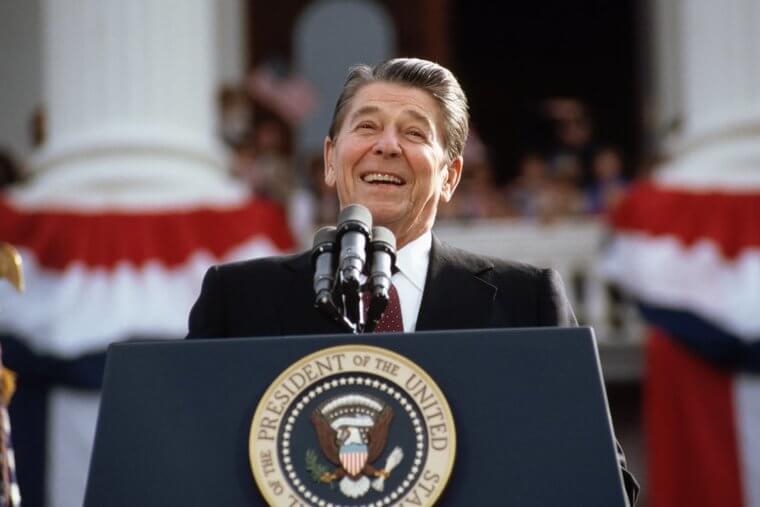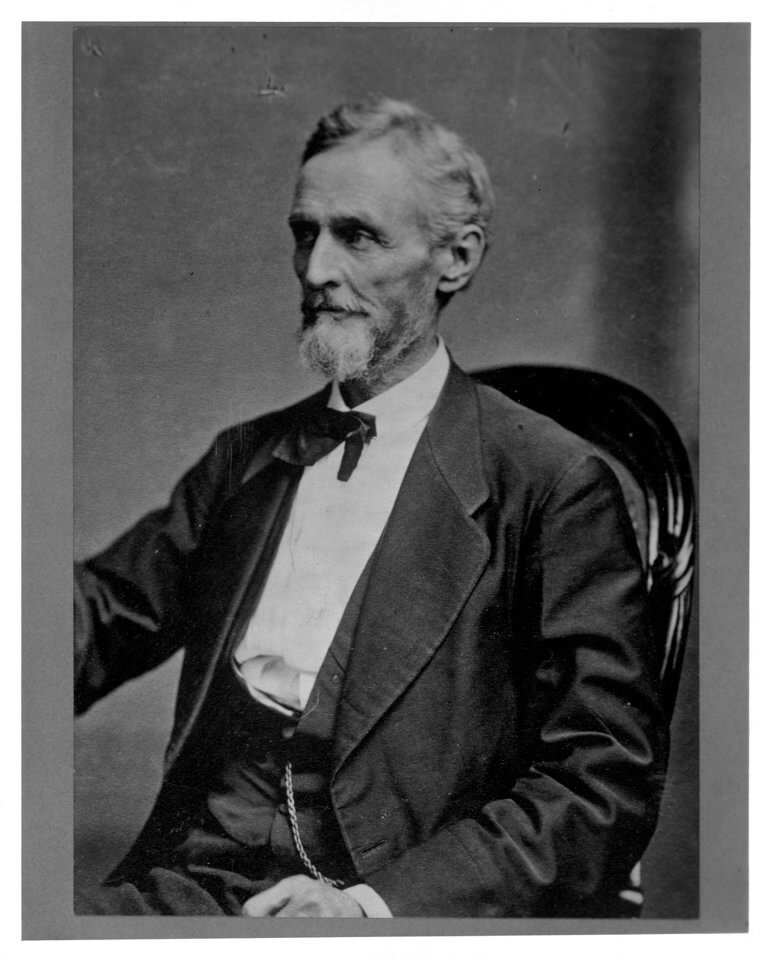From founding fathers to civil rights pioneers, America has produced many influential historical figures whose impact is still felt today. In this listicle, we celebrate 30 American pioneers who have left an indelible mark on the nation's history. From political leaders to inventors, activists to artists, these individuals have shaped the course of America's development, inspiring generations to come. Join us as we explore their lives, legacies, and enduring contributions to American society.
Amelia Earhart
Amelia Earhart's passion for aviation was sparked by a 10-minute flight at a state fair in 1918. From that moment on, she devoted her life to aviation, becoming one of the most celebrated pilots of the 20th century. Her groundbreaking achievements in aviation, including being the first woman to fly solo across the Atlantic Ocean, opened the door for future generations of women to pursue careers in aviation and aerospace.
Earhart's daring spirit and willingness to take risks in the face of adversity continue to inspire people today. Despite her mysterious disappearance during an attempt to circumnavigate the globe in 1937, her legacy as a pioneer and trailblazer in aviation remains strong. Amelia Earhart's passion for flight and her contributions to American history have left an indelible mark on the world.
Thomas Edison
Thomas Edison is often credited with inventing the light bulb, but his impact on American history goes far beyond that. He held over 1,000 patents and was a key figure in the development of the phonograph, motion pictures, and numerous other technological innovations. Edison's inventions revolutionized communication, entertainment, and everyday life for people around the world.
Edison also founded the first industrial research laboratory, which helped set the standard for modern research and development. Edison's contributions to American society earned him a place among the most important pioneers in history. His legacy continues to inspire scientists, inventors, and entrepreneurs to this day, as they seek to build on his work and make new advances that will shape the course of human progress.
Benjamin Franklin
Benjamin Franklin was a true American Renaissance man, with a diverse array of talents and accomplishments. As one of the Founding Fathers of the United States, he played a crucial role in shaping the new nation, including serving as a diplomat to France during the Revolutionary War and signing both the Declaration of Independence and the US Constitution.
Franklin was also a prolific inventor, with his inventions including the lightning rod, bifocal glasses, and the Franklin stove. He was a key figure in the development of the postal service and helped found the University of Pennsylvania. Franklin was also a gifted writer, authoring the famous Poor Richard's Almanack and writing extensively on a range of topics. Through his contributions to science, politics, and culture, Benjamin Franklin truly earned his place as one of America's most influential pioneers.
Harriet Tubman
Harriet Tubman was an American pioneer who fought against slavery and worked to help enslaved people escape to freedom via the Underground Railroad. The railroad would take some of them to Canada or Mexico and Spanish Florida. Others would be "moved" to the Caribbean islands and even Europe. Born into slavery herself, Tubman escaped to freedom and later became one of the most well-known "conductors" on the Underground Railroad, risking her life to guide others to safety.
Tubman also served as a spy for the Union Army during the Civil War and advocated for women's suffrage later in life. Tubman's bravery and perseverance in the face of extreme danger and oppression continue to inspire people around the world to this day. Her unwavering commitment to justice and human rights has earned her a place in history as a true American pioneer who helped change the course of the nation's development.
Steve Jobs
Steve Jobs was a true American pioneer who revolutionized the technology industry and changed the way people around the world interact with computers and digital devices. As one of the co-founders of Apple Inc., Jobs played a key role in developing some of the most iconic products of the digital age, including the Macintosh computer, the iPod, and the iPhone.
Jobs was known for his innovative and daring approach to design and technology, pushing the limits of what was possible and changing the course of the industry forever. Jobs' impact on American society and the global economy cannot be overstated, and his legacy as a pioneer in the field of technology continues to inspire entrepreneurs and innovators around the world to this day.
Susan B. Anthony
Susan B. Anthony was a pioneer for women's rights and played a key role in the women's suffrage movement in the United States. Along with Elizabeth Cady Stanton, Anthony founded the National Woman Suffrage Association and fought tirelessly for women's right to vote. She also advocated for women's rights in other areas, including property ownership and education.
Despite facing significant opposition and discrimination, Anthony never wavered in her commitment to achieving equality for women. Her tireless activism helped pave the way for the eventual passage of the 19th Amendment to the US Constitution, which granted women the right to vote. Anthony's legacy as a champion for women's rights remains an inspiration to people around the world who continue to fight for equality and social justice.
Henry Ford
Henry Ford was a true American pioneer who revolutionized the automobile industry and changed the course of transportation and manufacturing in the United States. He is credited with creating the first automobile that was affordable for the average person, the Model T, which helped usher in a new era of personal mobility and freedom. Ford's innovations in manufacturing, including the use of assembly line production, helped make the Model T and other cars more affordable and accessible to the public.
Ford's commitment to efficiency and standardization helped set the stage in the US for modern industrial production techniques. Ford's contributions to American society earned him a place among the most important pioneers in history. His legacy continues to inspire entrepreneurs, engineers, and innovators to this day, as they seek to build on his work and create a better future for all.
Martin Luther King Jr.
Martin Luther King Jr. was a true pioneer in the fight for civil rights and equality in the United States. A Baptist minister, King became a leading figure in the American civil rights movement in the 1950s and 1960s, advocating for nonviolent resistance and leading numerous protests and demonstrations. His most famous speech, "I Have a Dream," called for an end to racial segregation and discrimination, and has become an iconic moment in American history.
King's leadership and activism helped to pave the way for the passage of the Civil Rights Act of 1964 and the Voting Rights Act of 1965. Tragically, King was assassinated on April 4, 1968, at the Lorraine Motel in Memphis, Tennessee, but his legacy as a pioneer who fought for justice and equality for all people continues to inspire people around the world.
Neil Armstrong
Neil Armstrong was a true American pioneer who achieved one of the greatest accomplishments in human history - becoming the first person to walk on the moon. Armstrong was a NASA astronaut who piloted the Apollo 11 spacecraft in 1969 after commanding the Gemini 8 mission in 1966 and performed the first successful docking of two vehicles in space.
Armstrong made history when he took his famous steps onto the lunar surface, declaring "That's one small step for man, one giant leap for mankind." Armstrong's bravery and perseverance in the face of extreme danger and uncertainty helped pave the way for further space exploration and scientific discovery. His legacy as a pioneer who pushed the boundaries of human achievement continues to inspire people around the world to pursue their own dreams and reach for the stars.
John F. Kennedy
John F. Kennedy was a charismatic leader who left an indelible mark on American history. As the youngest person ever elected to the presidency, Kennedy brought new energy and optimism to the nation. He championed the space program, calling for a moon landing by the end of the 1960s and inspiring a new generation of scientists and engineers.
Kennedy also played a critical role in the civil rights movement, advocating for equal rights and desegregation in the face of widespread resistance. His eloquent speeches, including his famous inaugural address and his call to action on civil rights, continue to inspire people today. Though his presidency was cut short by an assassin's bullet, his legacy as a pioneer who changed the course of American history remains strong.
Rachel Carson
Rachel Carson was an American marine biologist, conservationist, and author who forever changed the way we think about the environment. In her seminal book, Silent Spring, Carson exposed the dangers of widespread pesticide use and its devastating effects on wildlife and human health. Her work sparked a national conversation about the importance of environmental protection and led to the creation of the Environmental Protection Agency (EPA) and the passage of landmark legislation such as the Clean Air Act and Clean Water Act.
Carson's amazing legacy as an environmental pioneer and trailblazer continue to inspire and motivate people around the world to take action to protect our planet for our kids and grandkids. Her pioneering work and tireless advocacy for our future have left an indelible mark on American history and her contribution to the modern environmental movement cannot be overstated. We need more of her today.
George Washington
George Washington is widely regarded as one of the most important and influential figures in American history. As the first president of the United States, Washington played a crucial role in shaping the young nation and laying the groundwork for the democratic principles that continue to guide it to this day. Washington was also a pioneering military leader, serving as the commander-in-chief of the Continental Army during the American Revolution and leading the charge for American independence.
Washington's leadership and determination helped to secure victory for the colonists and establish the United States of America as a free and independent nation. Washington's legacy as a pioneer who helped to shape the course of American history remains strong to this day, and his leadership and example continue to inspire people around the world. He was the first POTUS from 1789 to 1797.
Frederick Douglass
Frederick Douglass was a true pioneer in the fight for abolition and civil rights in the United States. Born into slavery in Maryland, Douglass escaped to freedom in 1838 and became a leading figure in the abolitionist movement, using his powerful oratory skills and literary talents to advocate for the end of slavery and the full inclusion of African Americans in American society.
Douglass became a renowned speaker and author, publishing several influential books and newspapers, including his autobiography, "Narrative of the Life of Frederick Douglass, an American Slave." Douglass' activism and advocacy helped to pave the way for the abolition of slavery in the United States and the eventual recognition of civil rights for African Americans. His legacy as a pioneer who fought for justice and equality continues to inspire people around the world to this day.
Abraham Lincoln
Abraham Lincoln is widely considered one of America's greatest presidents and an important pioneer who helped shape the nation's history. His leadership during the Civil War helped preserve the Union and led to the abolition of slavery, which had long been a stain on American society. Lincoln's Emancipation Proclamation and his support for the 13th Amendment to the Constitution helped pave the way for greater racial equality in the United States.
Lincoln was also a gifted orator and writer, known for his stirring speeches and his ability to inspire people to action. Lincoln's leadership and commitment to justice continue to serve as an example to people around the world, and his legacy as a pioneer of American history remains strong to this day.
Mark Twain
Mark Twain, born Samuel Langhorne Clemens, was an American author and humorist who lived during the late 19th century. His works, including "The Adventures of Tom Sawyer" and "Adventures of Huckleberry Finn," are considered classics of American literature and continue to be widely read today. Twain was known for his sharp wit and satirical writing style, which often commented on social issues of his time such as racism and imperialism.
Twain was also a prominent public figure, speaking out against injustice and advocating for causes such as women's suffrage and the abolition of slavery. As an American pioneer who used his writing to challenge the status quo and spark conversations about important issues, Mark Twain changed the course of history and left a lasting impact on American literature and culture.
Harriet Beecher Stowe
Harriet Beecher Stowe was an American writer and abolitionist who changed the course of history with her novel, Uncle Tom's Cabin. Published in 1852, the novel depicted the cruelty and inhumanity of slavery, helping to sway public opinion against it and fueling the movement toward abolition. The book quickly became a bestseller, with millions of copies sold in the United States and abroad, and it played a significant role in helping to galvanize the anti-slavery movement leading up to the Civil War.
Stowe's work was not only a literary masterpiece but also a powerful tool for social change. Her impact on American society cannot be overstated, as she helped to shift the nation's moral compass towards greater respect for human dignity and freedom. As an American pioneer who used her words to fight for justice and equality, Harriet Beecher Stowe remains an inspiration to this day.
Thurgood Marshall
Thurgood Marshall was a pioneering figure in American legal history. As the first Black justice on the United States Supreme Court, Marshall was a tireless advocate for equal justice under the law. Before his appointment to the Supreme Court, Marshall was already a groundbreaking figure in the civil rights movement, serving as the chief counsel for the NAACP Legal Defense and Educational Fund.
Marshall's legal victories, including the landmark Brown v. Board of Education case, helped to dismantle segregation and pave the way for greater racial equality in America. Marshall's unwavering commitment to justice and equality, even in the face of opposition and hostility, inspired countless others to continue the fight for civil rights. His legacy as a legal giant and a champion for social justice continues to shape American law and society to this day.
Cesar Chavez
Cesar Chavez was a trailblazing figure in the American labor movement. Born into a family of migrant farm workers, Chavez experienced the harsh realities of agricultural labor from a young age. He co-founded the United Farm Workers (UFW) and worked tirelessly to improve working conditions and wages for farm workers. Through boycotts, strikes, and other nonviolent tactics, Chavez and the UFW brought national attention to the plight of farm workers and their struggle for basic rights.
Chavez's leadership inspired a whole new generation of activists in the labor world and helped pave the way for greater needed protections for American workers across the country. Chavez's strong legacy continues to inspire young leaders who seek to build a more just and equitable society not only for workers, but his pioneering work in the labor movement will never be forgotten.
Jackie Robinson
Jackie Robinson is widely known as the first African American to break the color barrier in Major League Baseball, but his impact on American history extends far beyond sports. Robinson's integration of professional baseball challenged the deeply ingrained racism and segregation of American society. Through his exceptional talent and unwavering courage, Robinson forced the nation to confront its discriminatory practices and paved the way for future civil rights leaders.
Robinson's activism extended beyond the baseball diamond, and he used his platform to advocate for social and political change. He fought for the desegregation of schools, the end of police brutality, and voting rights for African Americans. Robinson's legacy as an American pioneer who changed the course of history is a testament to his indomitable spirit and his commitment to justice and equality for all.
Alexander Hamilton
Alexander Hamilton was one of the founding fathers of the United States and a key figure in the early development of the nation. As an immigrant from the West Indies, Hamilton quickly rose to prominence in American politics and played a vital role in shaping the country's economic and political landscape. He was a champion of a strong federal government and helped to establish the nation's financial system, including the creation of the US Treasury and the first national bank.
Hamilton was also a prolific writer and his contributions to the Federalist Papers are considered instrumental in the ratification of the US Constitution. Despite his unfortunate early death in a duel, Hamilton's legacy continues to shape American politics and his impact on the nation's history cannot be overstated. He is truly an American pioneer who changed the course of history.
Sojourner Truth
Sojourner Truth was an African-American abolitionist and women's rights activist who lived during the 19th century. Born into slavery, she escaped with her infant daughter in 1826 and later became a prominent speaker on issues of racial and gender equality. Truth's famous "Ain't I a Woman?" speech, delivered at the Ohio Women's Rights Convention in 1851, challenged the idea that women were weaker and less capable than men.
She was also an advocate for the Union Army during the Civil War, and met with President Abraham Lincoln to discuss issues facing newly freed slaves. Truth's life and work paved the way for future generations of civil rights and women's rights activists, and her legacy continues to inspire people today. As an American pioneer who fought tirelessly for justice and equality, Sojourner Truth changed the course of history.
Teddy Roosevelt
Teddy Roosevelt was a larger-than-life figure who left an indelible mark on American history. From his progressive policies and environmentalism to his advocacy for American interests abroad, Roosevelt was a true pioneer who helped to shape the course of the country and the world. As president, he championed policies that protected workers, regulated big business, and promoted conservation, paving the way for future reformers.
Roosevelt was also a pioneering figure in the United States' foreign policy, advocating for American interests around the world and playing a key role in the construction of the famous Earth-changing Panama Canal. His strong leadership, bursting charisma, and boundless energy continues to inspire people today, and his legacy as a pioneer who changed the course of American history remains strong.
Franklin Delano Roosevelt
Franklin Delano Roosevelt, FDR, was the 32nd President of the United States and one of the most influential figures in American history. He led the country through some of its darkest moments, including the Great Depression and World War II, implementing policies such as the New Deal to help revive the economy and providing strong leadership during the war.
His vision for a more just and equal society, including his advocacy for Social Security and workers' rights, has had a lasting impact on American society. FDR's fireside chats, in which he spoke directly to the American people, also helped establish a stronger connection between the president and the public. As an American pioneer who successfully navigated the country through some of its toughest challenges, FDR remains a beloved figure and a symbol of resilience and determination.
Rosa Parks
Rosa Parks, an African American civil rights activist, played a significant role in the American Civil Rights Movement of the mid-20th century. On December 1, 1955, Parks refused to give up her seat on a Montgomery, Alabama, bus to a white passenger, defying the state's segregation laws. Her act of defiance sparked a boycott of Montgomery's buses by African Americans, which lasted for over a year and led to the desegregation of Montgomery's public transportation system.
Parks continued to work for civil rights across the country, even after moving to Detroit, Michigan. She even became known as the "Mother of the Modern-Day Civil Rights Movement" and still she did not rest. She received numerous awards for her work and activism, including the Presidential Medal of Freedom, which is the highest civilian honor in the United States.
Albert Einstein
Albert Einstein was a theoretical physicist and a Nobel Prize laureate who became an American pioneer and a global icon of scientific discovery. Born in Germany in 1879, he immigrated to the United States in 1933, where he became a professor at Princeton University. Einstein is famous for his groundbreaking work on the theory of relativity, which revolutionized our understanding of space, time, and gravity. He also made significant contributions to the development of quantum mechanics and statistical mechanics.
Einstein's scientific insights paved the way for the development of many modern technologies we use today, including nuclear energy, lasers, and GPS. Einstein was also an outspoken advocate for peace, civil rights, and democracy, using his public platform to speak out against nuclear weapons and fascism. Today, Einstein's legacy continues to inspire scientists, thinkers, and innovators around the world, and his quotes, true or not, go viral on any given social network.
John Muir
John Muir was an American environmentalist, naturalist, and author who played a pivotal role in the conservation movement. He was instrumental in the creation of several national parks, including Yosemite, and his activism helped to protect wilderness areas throughout the United States. Muir's love of nature stemmed from his childhood in Scotland, where he developed a deep connection to the natural world.
Muir emigrated to the United States in 1849 and eventually settled in California, where he devoted his life to exploring and advocating for the preservation of wild places. Through his writings and speeches, Muir inspired generations of Americans to appreciate the beauty of the natural world and to work towards its protection. His legacy continues to inspire environmentalists today, making him one of the most significant American pioneers who changed the course of history.
Elvis Presley
Elvis Presley, known as the "King of Rock and Roll," is an American pioneer who changed the course of music history. With his charismatic performances and unique voice, he became a cultural icon and a symbol of rebellion for a generation. His fusion of country, rhythm, and blues, and rockabilly created a new sound that captured the hearts of millions worldwide.
Presley's influence on music was not limited to his innovative style. He also challenged the social norms of his time through his music, pushing boundaries and breaking down barriers. He helped bring rock and roll to the mainstream, paving the way for future artists to explore new sounds and express themselves freely. Even after his untimely death, Presley's impact on popular culture remains strong. He continues to inspire new generations of musicians and fans, cementing his status as an American pioneer who changed the course of history.
Jonas Salk
Jonas Salk was an American medical researcher and virologist who changed the course of history with the development of the polio vaccine. In the early 1950s, polio was one of the most feared diseases in the United States, affecting tens of thousands of people each year and causing widespread panic. Salk devoted himself to finding a way to prevent the disease, and after years of research, he and his team developed a vaccine that was safe and effective.
When the vaccine was first tested in 1954, it was a resounding success, and within a few years, the incidence of polio in the United States had dropped by 90 percent. Salk's work not only saved countless lives but also had a profound impact on public health worldwide, leading to the near-eradication of polio as a global disease. As an American pioneer who dedicated his life to improving the health and well-being of others, Jonas Salk is a true hero and an inspiration to all.
Ronald Reagan
Ronald Reagan is widely regarded as one of the most influential American presidents of the modern era. His leadership style, conservative policies, and persuasive rhetoric transformed the political landscape of the United States and left an indelible mark on the nation's history. Reagan's economic policies, which included tax cuts, deregulation, and increased defense spending, were instrumental in stimulating economic growth and ushering in a new era of prosperity.
His foreign policy, particularly his hardline stance against the Soviet Union, helped to end the Cold War and usher in a new era of global cooperation. Reagan's leadership and vision helped to shape the United States into the superpower it is today and his impact on American history will be felt for generations to come. He is truly an American pioneer who changed the course of history.
Here Are Some of the Rarest Photographs of Iconic Historical Figures
While in our days, almost every person has access to some sort of camera, back in the day, having someone’s photograph taken was not only a privilege but also a pretty rare occasion. Thankfully, after the first photograph was taken about 200 years ago, there was a sort of “twilight” period in which historical figures got their pictures taken and recorded, though not many people were lucky enough to have access to such historical portraits. From the likes of Harriet Tubman, John “Johnny Appleseed” Chapman, and Billy the Kid, here are some of the most astonishing pictures of historical figures from over the years.
Nikola Tesla
Nikola Tesla was a Serbian-American genius. He made strides as an inventor, mechanical engineer, electrical engineer, and futurist who became known for making contributions to the design of the modern alternating current electricity supply system. After studying engineering and physics back in the 1870s, Tesla never received a degree and opted for getting into the workforce and working in telephony.
After he moved to the United States in 1884, Tesla set up his own companies and laboratories and began developing striking mechanical and electrical devices that eventually led to his famous contributions. Even though Tesla notoriously came from a family with severe mental health issues, he managed to rise above and become one of the most significant inventors of the time.
Annie Oakley
Annie Oakley is well known for being one of the most famous American sharpshooters of all time. Born in 1860, Oakley grew up at a time when a girl or woman being a sharpshooter was virtually unheard of. Born Phoebe Ann Mosey, Oakley went against all odds and began sharpshooting when she was only a child.
When she started shooting as a kid she was hoping to develop her hunting skills to help her family who was quite impoverished in Western Ohio. Oakley gained her public fame after winning a sharpshooting contest at the age of 15 against a very experienced marksman called Frank E. Butler. Funny enough, she would later marry Butler and the two of them would become two of the most famous sharpshooters of their time.
Charles Darwin
Charles Darwin is famously known for his many contributions to evolutionary biology, including the publication and dissemination of his book “On the Origin of the Species.”
A man of controversial ideas, Darwin came up with the idea that all species share one common ancestor, and even though he went against many governing religious ideas of the time, his theories ended up becoming extremely important to modern science. Darwin’s contributions have been so fundamental to science that after his death, he was honored by burial in Westminster Abbey.
Grand Duchess Anastasia Nikolaevna
Grand Duchess Anastasia Nikolaevna of Russia was the famous and youngest daughter of Tsar Nicholas II, the last Tsar of Imperial Russia, and his wife Tsarina Alexandra Feodorovna.
Nikolaevna was killed alongside her family by a group of Bolsheviks in Yekaterinburg in 1918 at the young age of 17. There were many rumors surrounding her death, including the possibility that she had managed to escape at the last second. Her site of burial was unknown for decades until her remains were later discovered and the possibility of her having survived the killings was disproved.
Armenian Freedom Fighters
The 19th century was rife with national uprisings, and in the midst of all the fighting these two brave women were captured standing proud and ready to fight. Taken after a horrific massacre done by the Ottoman in 1895, the photo features Armenian fighter Eghisapet Sultanian (on the right) and another woman who was never identified.
Like many Armenian women at the time, which was arguably one of the darkest periods in Armenian history, they didn't shy away from fighting for their freedom. From their strong looks and proud demeanor, all we can do is look at them with admiration.
Vincent Van Gogh
Vincent Willem van Gogh was a Dutch post-impressionist artist who is known as one of the most influential figures in Western art history. He became famous posthumously, after committing suicide in 1890 as a result of his psychotic delusions.
By then, he had already completed more than 2,000 works in less than a decade, though most of his work had been basically ignored when he was alive and was only properly noticed after his death. Some of his works include portraits, self-portraits, landscapes, and still lifes that are widely recognized as his thanks to the bold colors he used, and the dramatic style he used in his brushwork.
The English Patient
Like many old photos, sometimes knowing the story behind the face can be quite tragic, and this is true in the case of this image, taken in 1855.
The person featured here was a patient in the Surrey County Asylum, as a part of an experiment done by Dr. Hugh Welch Diamond, who worked at said Psychiatric facility. Diamond worked under the pretense that different types of mental illness manifested differently and in a unique way on people's faces, as the face was thought to be the mirror of the soul. Sadly, we don't know the identity of the person in the photo to this day.
Hellen Keller
Helen Keller was an American author, political activist, lecturer, and disability rights activist who lost sight and hearing when she was only 19 months old. Keller became eminently known for her persistence and consistency in learning literacy and communication through sign language.
His biggest influence was her teacher and life partner Anne Sullivan, who had a tremendous impact on her learning and activist work. Not only a huge activist for disability rights but also for women’s rights, Keller was the author of 14 books and became the first-ever deaf and blind graduate from Harvard University.
Grigori Rasputin
Grigori Efimovich Rasputin was a Russian mystic and “holy man” who worked for the Romanov family until his assassination. The self-proclaimed holy man befriended the royal family of Nicholas II for years and was close to the last Emperor of Russia.
Through his ties to the family, he managed to gain quite a bit of influence during the last moments of the Russian Empire. For years, he acted as a healer for the Emperor and Empress consort’s only son, Alexei Nikolaevich, who suffered from hemophilia. At court, he was always a divisive figure, as some Russians saw him as a religious charlatan, while others believed in his power to heal. He was assassinated in 1916 by conservative Russian noblemen who disapproved of his influence over the Empire.
Charles Dickens
Charles Dickens was an English writer and famous social critic who produced some of the most world-renown fictional characters in history. He was the author of novel classics such as "Tale of Two Cities," "Great Expectations," and "Oliver Twist," and was labeled a literary genius in the 20th century by critics and scholars from all over the world.
In addition to his literary works, Dickens was also a committed campaigner for children’s rights, education, and a number of other social reforms. Unfortunately, Dickens suffered from severe depression and bipolar disorder and struggled with it until his death in 1870.
Sylvia Plath
Sylvia Plath was an American poet, author, novelist, and short story writer who is known for advancing the genre of confessional poetry. Amongst some of her most famous works are "Ariel," "The Bell Jar," "The Colossus," and "Other Poems."
She was awarded the Pulitzer Prize in Poetry in 1982 after passing away in 1963. She was married to fellow poet Ted Hughes, and the couple lived together in the United States after their wedding in 1956, and then moved to England. They had a pretty thunderous relationship, and at some point, Plath claimed to have suffered abuse from him. They had two children, separated in 1962, and Plath killed herself in 1963 after struggling with depression.
Calamity Jane
Calamity Jane was another iconic sharpshooter, frontierswoman, and storyteller from the Wild West who was famously known to perform at Buffalo Bill’s Wild West show. Born Martha Jane Canary but later known as Calamity Jane, the iconic figure was also widely known for being a close acquaintance of Wild Bill Hickok.
Her character was admired by many, with it being described as strong but incredibly compassionate for the needy and the sick. She was also recognized for her distinctive style, which included wearing men’s clothes and doing whatever she wanted without fear of judgment from others.
Jefferson Davis
Jefferson Davis was the President of the Confederate states between 1861 and 1865 and spent much of his life in the world of politics wearing different hats. Before the American Civil War, he represented Misssissipi in the United States Senate and was also a member of the Democratic Party.
Beforehand, he served as the Secretary of War for the United States under the presidency of Franklin Pierce. During the war, he appointed the commander-in-chief who guided Confederate policy, until the Confederacy was defeated in 1865. He was subsequently captured and accused of treason but was released after two years in prison. Over the years, he has been criticized for supporting slavery and racism, with several memorials of him having been removed with time.
Butch Cassidy
Different from some of the historical figures that we’ve already mentioned, Butch Cassidy became famous for something a little dodgier throughout his life - he was an iconic Old West train and bank robber.
For more than a decade, Parker engaged in criminal activity in the United States, where he became the leader of an entire gang of criminal outlaws like him called the “Wild Bunch.” But after years of being investigated by a stubborn group of operatives from the Pinkerton detective agency, Cassidy didn’t have any other choice but to flee the country with his accomplice and his accomplice’s girlfriend. He would famously die in 1908 during a shootout with the Bolivian Army, and many film adaptations about his life have been made since then.
Frederick Douglass
Frederick Douglass was an American social reformer, writer, statesman, and abolitionist who gained prominence for not only escaping slavery but also becoming an important abolitionist in the history of the United States.
After he escaped slavery in Maryland, he went on to become a revolutionary abolitionist both in Massachusetts and New York. His oratory and antislavery writings were inspirational to many and quickly made him a central figure in the movement. More importantly, he was a contrast to slaveholders' ideas of slaves, who believed that slaves did not have the intellectual capacity to be independent just like any other American citizen.

